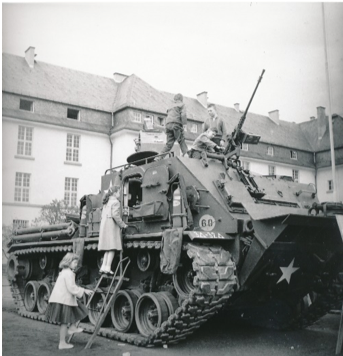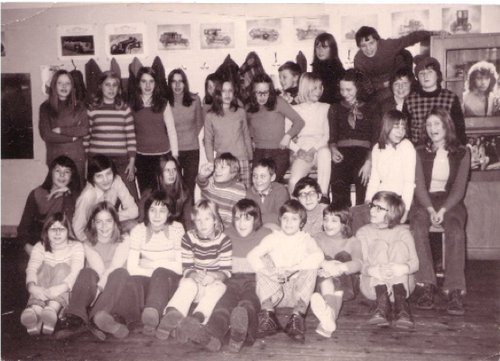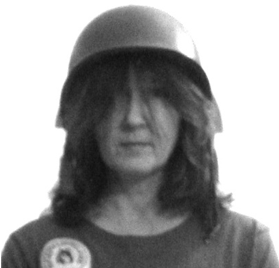TODAY IS EASTER MONDAY
Mayor Michael Keller once called the barracks site in the south of the city an "unheard-of stroke of luck" for Friedberg, as new building land is slowly becoming scarce. The area of abandoned barracks and residential areas, which was created after the Americans left, stretched from Karlsbaderstraße at the level of Dachspfad to the end of Ray Barracks. Its use is still not regulated and I often think of the times when the Amis once accompanied us at every turn through our cozy little town.
The first Americans I can remember were in the pastry display "beim Theobald", a tiny retail store on the corner of Karlsbader - Breslauer Straße. As children, we often accompanied our grandmother there for shopping and were then allowed to take home one of the small round cakes with icing on the flattened bottom. To this day, I don't know why these little pieces are called "Americans." But the young men in uniform certainly didn't bring them in, because they existed before the war (or so they say).
Flesh-and-blood specimens have been part of the Friedberg street scene for as long as I can remember, but they were not "Americans", they were "Yanks". The penny only dropped later. In the early sixties I often looked enviously at the swings on the playgrounds of the living quarters of the Ray Barracks as I drove by: wide canvas cloths hung from long chains on which two children could comfortably sit. Our German swings were not as wide and the seat was made of a wooden board. How I would have loved to try the exotic swings! The grass is always greener on the other side of the fence.
In other ways, too, people were aware of the American presence at every turn: beautiful gas guzzlers drove leisurely up and down Kaiserstrasse, with fins and a wide, undivided back seat. Back then, cars still had personality: they weren't streamlined and no one cared if they cut a good figure in the wind tunnel. They were just "incredibly cool."
The sporting activities of the GIs also brought a touch of the exotic to the small town. At the corner of Königsberger Straße and Im Wingert, baseball games took place regularly. The young men on the field were brimming with confidence, chewing boredly on their Wrigley's spearmint while the pitcher took all the time in the world to aim the ball. The players' families had gathered on a small wooden grandstand and, when they weren't mouthing off, were enthusiastically cheering on their team. Physical sustenance was well taken care of: a BBQ and plenty of beer on the side of the road provided a steady supply. Little by little I understood why and when who threw, caught and ran, and so I decided that one day I too would like to hit a homerun so cool among cheering fans. But it was not to be, because none of my friends showed the slightest interest in my new favorite sport. Later, when I was a teenager hitchhiking through California, I bought my first baseball glove. It still sits in a corner of my living room, waiting to catch another ball.
At Christmas time, as we drove by, we stared at the brightly lit windows of the living quarters, decorated with colorful fairy lights. Around "wandering" lights shone the facades and the glittering, candy-colored Father Christmas with Rudolph and reindeer. Today, only one adjective would come to mind, but back then, the sight of these lavish Christmas decorations enchanted me.
I didn't realize until many years later that this road was only open to the cars of American residents, when I noticed during my practical test how my driving instructor began to nervously fiddle with his buttons (seat belts didn't exist back then). We passed the baseball field and I whizzed past the gate to Ray Barracks. Now even the inspector was getting a little pale around the nose, "Are we allowed to drive in here?" I nodded thoughtfully and reassured him, "Why yes, we've been driving here for as long as I can remember!"
Well, I passed the practical test a few weeks later at the second attempt.

One day I found cooking pots in my grandmother's kitchen cupboard with "1-2-3- cups" written on the inside. Yes, that was a remnant of the Americans who had lived with them as subtenants on Danziger Strasse, she explained. A young couple, their names were Byron and Janice. Since my grandma didn't speak English, she missed a hint or two from her subtenants about the upcoming weekend: "Mummy, we're going to give a party and you don't know it!" The two stayed with my grandparents for over a year and gave birth to their daughter there. Unfortunately, contact broke off in later years.
My mother's generation has without exception positive memories of the Americans: as a student at the Schiller School, she and the whole class were invited to the barracks, where the Americans served them hot chocolate with doughnuts and gave them a package of surprises - a treat in the otherwise rather dull post-war period.
My personal memories of the GIs are also unclouded: As children, we often pulled our sleds up the long road to Winterstein and then tobogganed at breakneck speed down the long road to the highway bridge in Ockstadt. Fortunately, the Americans' troop cars always stopped when we waved and took us up onto the loading area along with our sleds. Communication was limited to "Hello," "Thank you," and "Bye Bye!" due to our very modest knowledge of English, but we always felt comfortable on the semi-open troop cars. The GIs treated us to Wrigley's Spearmint Gum and then, arriving at the maneuver site, lifted us and our sleds safely down into the snow.
During my teenage years, I was also fond of the American youngsters, as they were far more attractive and funnier than the local specimens. Every Tuesday evening, Americans and Germans met at the Contact Club in the "Hotel zur Post" for a lively discussion. Most of the time, somewhat older people appeared and told us about their service in the Vietnam War. This was interesting, but it didn't keep me there very long: the alternative program in the barracks provided serious competition. One day, I was invited to a "50s Party" and showed up at the barracks gate on the evening in question - dressed more or less appropriately. Even though we were in and out of Ray Barracks at the time, you couldn't get to bowling alley or the Capri Club unless you were accompanied by a GI. And so Stan picked me up at the main gate, where a uniformed guard conscientiously checked people and cars.
The party was well attended and I chatted with Tom from Orange, Texas, whom I also knew from the "Sanssoucis". In those days, if a GI liked to interrupt a conversation with a guest, it was done very straightforwardly. The choreography was well rehearsed: Two GIs picked Tom up by his shoulders and arms, dragged him backward across the chair, and set him back on his feet at the next table. This all happened in a split second, as did the twirling of the chair, on which a young man I didn't know now sat down, saying, "Hi. I'm T.J. What's up?"
T. J. (Thad Johnson was his name, but he was known only by his initials) later taught me to play chess at the old youth center on Bismarck Street. I will never forget many others either. There was Wayne, for example, who told me the story of the Wizard of Oz on a walk in the woods - later he sent me the book to Paris, where I spent my au-pair time.
And so my relationship to "our Amis" was not clouded even by the propaganda of my school friend Stefan, who tried to make it clear to everyone that our American friends were "occupiers". I didn't take the whole thing so seriously, since at the time he stated "farmhand" as his career aspiration, and in the Korean Near War cut during German class he carved the "Internationale" into his table in the bicycle basement of the former E1, where we were taught during 10th grade. (I myself, of course, was a model student, but because of my classmates' behavior, our class was banished to the school's former bicycle basement for a year).

Over the years, my interest shifted in favor of more exciting venues. Later I visited the German-American Friendship Festival, but it was rather dull, a normal fair with a hill-and-dale track and the food was under acquired taste. The rodeo on the runway of the former airfield between Friedberg and Ockstadt was my last contact with the Americans stationed here. And the competition for the Elvis Presley Bowl I only followed via the media. Yes - the prize was indeed the toilet bowl on which (among others) Elvis relieved himself.
Even today I have a souvenir of the topsy-turvy Ami time: My steel helmet with inlay, which I can rarely keep on my head for more than a few minutes ...
In former times one had just stronger neck muscles.
